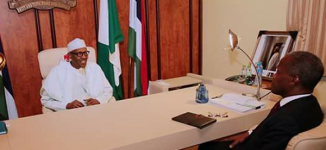Perhaps, the debate about how to restructure Nigeria is the in-thing today. An whereas there is a lot of channel noise in the narrative, there is need to create focus and engage the issues with the clear-headedness it deserves.
In the following pages, the arguments for restructuring Nigeria are laid bare. ELDER Statesman and Chairman of the Southern Leaders of Thought, SLT, Professor Ben Nwabueze, SAN, is usually on a very familiar turf whenever the issue has to do with constitutionalism, rule of law and political structure. He was in his late 30s when along with the late legal Icon, Chief FRA Williams, SAN, played critical roles in the 1977 Constituent Assembly that hammered out the 1979 Constitution.
Then he was energetic, full of life, pushful and daring. In between, he had his hands full with efforts to amend the constitution and ensure an egalitarian society on the plank of The Patriots, Project Nigeria and National Summit Group, NSG, among others. Ben Nwabueze, Saraki and Muhammadu Buhari Since the first outing in 1977, the erudite lawyer is yet to realise his dream polity for Nigeria. It is, therefore, not surprising that he is leading a host of southern leaders on the banner of the Southern Leaders of Thought, SLT, to champion the restructuring of the country.
Variants of restructuring Of late, many variants of restructuring have emerged but two remain popular. One is to retain the 36 states as federating units with more powers and resources devolved to them. The other is a return to the 1960/63 constitutions that enabled the regions/federating units to have their constitutions, controlled their resources and contributed 50 per cent to the centre.
Six geopolitical zones as federating units Those in this school of thought want the six geopolitical zones to become the federating units. This is the view being canvassed by the the Professor Nwabueze-led SLT and they want President Muhammadu Buhari to lead the crusade to restructure the country as an apostle of change. The SLT restated its call on Thursday at a press briefing held at Chief FRA Williams’ Chambers in Lagos. Professor Nwabueze, 86, marshalled the position of the group. In a barely audible, husky but baritone voice, he took about 30 minutes to read the 13-paragraph statement of the SLT on restructuring.
Restructuring will end agitation for Biafra He said that the ongoing agitation for the Republic of Biafra could be speedily resolved with the restructuring of Nigeria. How? Nwabueze said the leader of the Indigenous People of Biafra, IPOB, Nnamdi Kanu, had assured him that he (Kanu) would persuade IPOB members to slow down on Biafra agitation and opposition to the conduct of the 2019 general elections, if Nigeria is restructured as being demanded by the SLT.
Indeed, the southern leaders of thought said that ‘’negotiated re-structuring, implemented through a new constitution, is the best assurance for the realisation of our collective desire for one Nigeria.’’ Those opposed to restructuring will break Nigeria Speaking on Kanu’s conditions to drop the agitation for Biafra, Nwabueze said: ‘’I now take the opportunity to announce that the Leader of IPOB, Nnamdi Kanu, who has been castigated for wanting to break-up Nigeria through Biafra has authorised me to say that if there is progress along the lines of restructuring that he would persuade his group to give up their demand for Biafra and to discontinue the threat to disrupt the 2019 election.
So, anybody who is opposing restructuring is the one breaking Nigeria, not Nnamdi Kanu… If they refuse (to restructure the country) then there will be trouble. And the trouble would not be caused by Nnamdi Kanu but those who oppose restructuring.’’ Notable SLT members at the briefing included Chief Solomon Asemota, SAN, Professor Kimse Okoko, Professor Akin Oyebode, Professor Anthony Kila, Evangelist Elliot Uko, Chief Tola Adeniyi, Comrade Wale Okunniyi and Mr Chigozie Ubani.
Why Buhari must lead restructuring moves The leaders urged President Muhammadu Buhari to lead the move to restructure the country. ‘’We think the way forward for Nigeria is for the people, in exercise of the power inherent in them as a sovereign people, to make, through a referendum, a new constitution, constituting a new political order. The process must be led by the President, as the elected leader of the people imbued by an ardour for change.’’ Asked what would happen if the president refused to back restructuring, Nwabueze said it is for Nigerians to respond as a sovereign people who have right to govern themselves.
Insisting that restructuring will address the rot in the polity and accelerate socio-economic and political development of the country, the leaders, in a statement signed by Nwabueze said: ‘’We, members of the group of Southern Leaders of Thought, are committed Patriots, imbued with an abiding faith in one Nigeria, and the belief that the majority of Nigerians share the same faith, but wish to be given an opportunity to negotiate changes in our governmental structures, needed to accomplish their desires believing that appropriate structures must be put in place for good governance, another of vital needs, to take place.
‘’In our circumstances as a country, with a vast expanse of territory, comprising a great diversity of ethnic nationalities, with divergent interests and outlooks, it seems generally agreed that a federal system, truly so-called, is the system appropriate to our situation. We therefore conceive re-structuring as requiring, modified as necessary, the restoration or re-establishment of the kind of federalism that existed under our 1960/1963 Constitutions. That is the central object or purpose of restructuring.
‘’In more explicit words, the essential purpose of restructuring is to enable the component ethnic nationalities, grouped together by affinity of culture/language or territorial contiguity, to govern themselves in matters of internal concern, leaving matters of common concern, not overwhelmingly extensive in their range, to be managed under a central government constituted in such manner as to ensure that it is not dominated by any one group or a combination of them, and above all, to ensure justice, fairness and equity to all in the management of matter of common concern.
It assures an optimal measure of self determination or self-government consistent with the territorial sovereignty of the country… ‘’Restructuring is not a matter that can be implemented by amendment of the 1999 Constitution. It imperatively requires a new Constitution adopted or approved by the people at a referendum.’’ The leaders kicked against the National Assembly’s stand that the 1999 Constitution can only be amended or altered (sections 8 and 9) but cannot be abolished and replaced by a new constitution because ‘’it fails to take account of the fact that the 1999 Constitution is only a Schedule to a Decree 24 of 1999.
That Decree is an existing law under Section 315 of the 1999 Constitution and, like all existing laws within federal competence, can be repealed by the National Assembly.’’ Besides, they said: “The fact that the 1999 Constitution was not made by the people constitutes a flaw in it that cannot be cured. Nothing can change its character as a constitution made, not by the people, but by the Federal Military Government, FMG and simply imposed on the people by that government.
Thus, even if all the proposals to be contained in a new constitution for Nigeria were to be integrated into it, it would still remain what it is, a constitution made by the FMG, and would still not meet the desire and demand of Nigerians for a new constitution made by themselves and for themselves, and deriving its authority, as the supreme law of the land, directly from the people by means of a referendum. “In other words, the 1999 Constitution can never become a democratic or a peoples constitution by integrating into it all the decisions and outcomes of the deliberations by the people at a national convention or constituent assembly.
Integrating the decisions of the 2014 National Conference into the 1999 Constitution is like putting new wine into an old, cracked bottle Contaminated by dead decomposing things inside it, the effect of which would be to emasculate our aspirations for rebirth, greatness and unity.”
Failure to restructure is postponing the evil day – Uko Speaking on the issue, Evangelist Uko, who is also the leader of the Eastern Consultative Assembly, ECA, said restructuring is ‘’a battle between the forces of light and darkness. The forces of darkness are those who want to use the 36 states as the federating units while the forces of light are those who want to restructure the country once and for all by going back to the fundamentals of the First Republic, get a new constitution approved at a referendum to move Nigeria forward.’’ He continued: “Negotiation must be based on a new constitution.
We assure those who are opposed to restructuring and boasting that they have compromised southern leaders to toe their path that they won’t succeed. What they are doing is to postpone the evil day because the agitation will continue.”
The Vanguard

